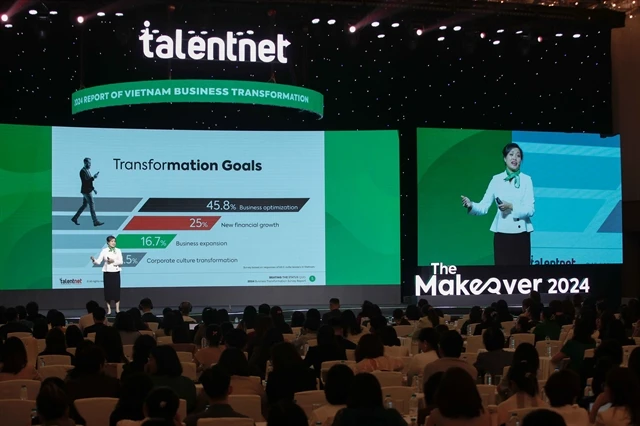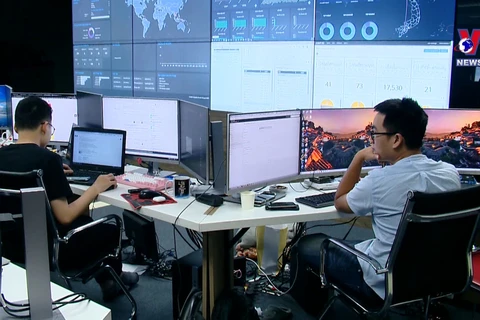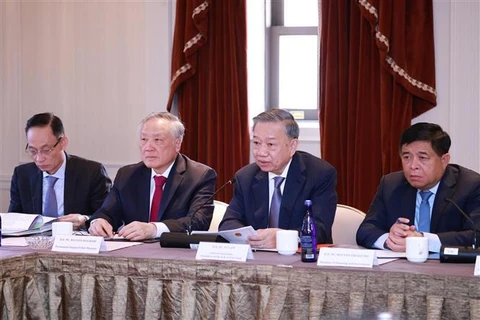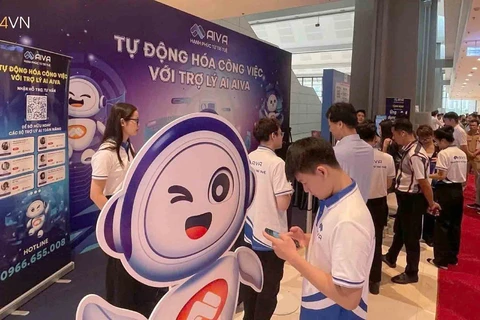
HCM City (VNS/VNA) - Some 41% of Vietnamese businesses have begun a transformation focusing on operation and processes, organisational structures and workforce, and customer experience, a conference heard in Ho Chi Minh City on October 15.
Organised by Talentnet, the two-day conference themed "Foster Green Dynamics” featured more than 20 leading global innovation strategists who spoke about AI and green workforce, collaboration and compensation.
It attracted more than 1,000 attendees, including business leaders and HR experts from top companies in the country.
Speaking at the event, Tieu Yen Trinh, CEO of Talentnet Group, said 41% of Vietnamese businesses started their transformation in the last three years, 25 percentage points lower than foreign companies (66%).
But 46.1% of businesses are satisfied with their transformation progress, a figure notably higher than the global average (25%), showcasing the confidence of Vietnamese businesses in their approach, she said.
Trinh said 62.5% are focused on operation and process enhancement, 50% on improving their organisational structure and workforce and 47.9% on the customer experience.
She offered several recommendations to help businesses optimise their transformation in a volatile market environment, saying: “An effective transformation strategy must stem from the company’s purpose and needs. But for each business, this is a different variable. Therefore, I believe the key is to maintain consistency in purpose but remain flexible in approach.”
She added that once the purpose is clear, businesses can apply the 3Cs, Communicate, Collaborate, and Commit, communicating to align their internal vision on transformation goals, collaborating both within and outside the company to drive transformation, and remain committed to established goals.
AI driving businesses towards sustainable future
In his presentation “Powering Your Organisation with AI,” Mitchell Pham, advisor to APEC governments on advancing digital economies and an Asia 21 Fellow and Global Council Member of the Asia Society, emphasised the importance of adapting AI in all aspects of an organisation to enhance productivity and innovation.
He said the rapid growth of AI, from basic models to deep learning systems and big data, is becoming mainstream and driving innovation.
He said technology has many diverse forms, and so transformation within organisations not only relates to technology but also requires changes in people, processes and governance.
Soft skills like critical thinking and teamwork are crucial in the AI era, and in governance, AI must be applied safely, ethically, inclusively, and in compliance with legal regulations, he said.
Furthermore, AI is seen as a key factor in driving green technology and addressing complex environmental issues that traditional solutions could not solve, he said.
“With technology, you don’t need to predict the future - you create it.”
‘SuperCollaboration’ formula between humans, AI
James Taylor, an award-winning speaker and internationally recognised leader in creativity and innovation and an advisor to CEOs & entrepreneurs in many parts of the world, highlighted the role of creativity and the “SuperCollaboration” formula between humans and AI to drive sustainable business development.
“The first skill needed in the AI era is creativity - the ability to create, develop and implement new ideas to drive innovation and optimise technology,” he said, stressing that practical and useful ideas are the foundation for breakthrough innovations, often stemming from the combination of creative minds and critical thinkers.
“SuperCollaboration is the ability that every individual employee has today to augment their human creativity by collaborating with exponential technologies like artificial intelligence, IoT and robotics.”
Research by Harvard University claimed that with the help of AI tools like ChatGPT, consultants at Boston Consulting Group worked 25% faster and produced 40% better quality work than their colleagues who did not use AI, he said.
Even for experts, AI could help push the limits of creativity, he said.
He encouraged businesses not only to use AI for automating tasks but also to unlock its potential to push the creative boundaries of their talent.
The collaboration between AI and humans would be a crucial factor shaping the future of businesses, he claimed.
Participants also gained insights into expanding cooperation through building trust in national brands, understanding the role of HR, and investing in talent, and others.
Talentnet also unveiled its Talentnet-Mercer Salary Survey with in-depth data across various industries, and introduced the concept of Pay Agility, a new global trend that is beginning to take shape in Vietnam in various forms./.






















